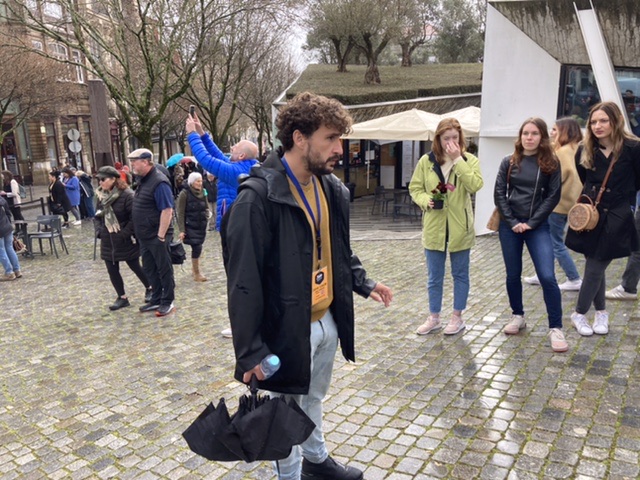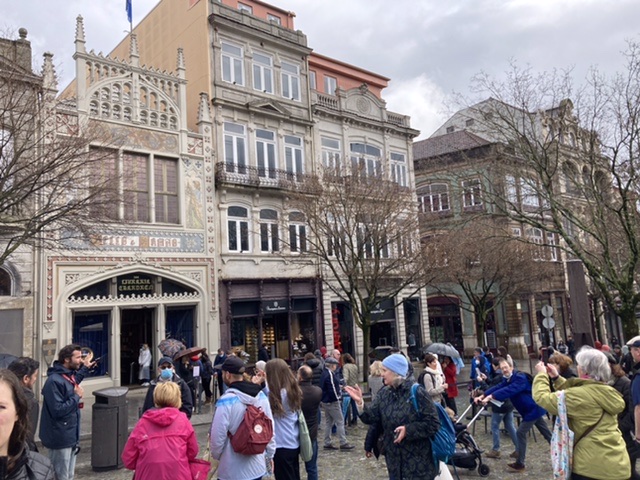No great rush this morning, so a leisurely breakfast, did some washing in the hope that it would dry before we leave, and headed off to our morning free walking tour of the city, via a coffee shop of course. There were 18 in our tour group, and we spent three hours getting a potted view of the history of Porto from our architect tour guide – Jaime. As is usual, his life is a real mixture. If I can remember, he was born to a Jewish mother in Angola which was a Portuguese colony at the time. He then came to Portugal before living in India and studying in Mexico, before going to Argentina, marrying and staying. When that fell apart he came back to Portugal, and has just got engaged to a Spanish woman from Barcelona who is working at an emergency clinic in Sudan.

We learned, amongst three hours of rapid patter, that the most repugnant word in Porto is ‘Lisbon’. It seems that the relationship between the two major cities of the country is fraught. They see themselves as different people. Both towns with complicated histories, really only united by the fact that they didn’t want to be ruled by Spain. So they have combined to fight the Spanish, the French, and the Germans (in WW1). But they have also fought a civil war against each other, as the King of Lisbon wanted to rule the lot, and they were somewhat reluctant to inherit a king when they didn’t have one. According to our guide, they declared themselves a republic three years before the rest of Portugal did the same.
It may be that the only reason they are within the same country is the despotic and brutal reign of the dictator Antonio Salazar. Salazar as a young man lived through the revolution that overthrew the Portuguese monarchy, and became involved in politics in 1926 after the military coup shortly thereafter. Distinguishing himself as Finance Minister from 1928 and bringing order back to the country’s economy, he became Prime Minister in 1930 and never relinquished it until 1968 before dying in 1970. In the usual fashion of most dictators, he used more and more brutal means as the years rolled on to stay in power as his popularity waned, and the secret police flourished. Keeping the populace poor and illiterate didn’t hurt either. For the last 23 months of his life, he wasn’t even aware that he’d been sacked by the President, and continued to think he was exercising his usual powers.
During his reign, he kept the country from being overtaken by Spain during the Spanish Civil war, assisted millions of displaced Europeans during the second world war, and helped found NATO, so there were good points, but Portugal was increasingly viewed as a pariah state in the 60s because of the country’s treatment of their colonies. Subsequent to his death, the de-colonisation of their territories sped up, with Macau being the last colony handed back in 1999.
Stopped outside the ’Harry Potter’ bookshop where JK Rowlings wrote the first three chapters while she lived here. Now people queue to pay $5 to get inside for a look!

Porto also suffered as a result of the Portuguese Inquisition, with roughly one quarter of the town’s population – mainly Jews and Muslims – fleeing or being expelled, leading to a huge downturn in the economy. Most of them went to Amsterdam, which is why there is a large Portuguese influence there.
Following a stop for the group to buy coffee and morning tea (turns out it was Jaime’s aunt and uncle’s shop), we finished with a view over the river, the monastery, and the bishop’s palace.

Tea back in our palace.